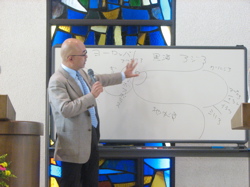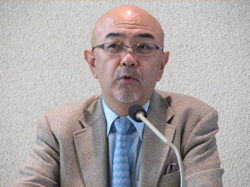Center for Interdisciplinary Study of Monotheistic Religions(CISMOR)Doshisha University
> Public Lectures > Secularism in Turkey: A Turning Point in the 85-Year Experience of the Unity of the RepublicPublic Lectures
Lecture (Open for the public)
Secularism in Turkey: A Turning Point in the 85-Year Experience of the Unity of the Republic
| Date: |
2008/10/04 13:00-14:30 |
|---|---|
| Place: | Chapel in the Divinity Hall, Imadegawa Campus, Doshisha Univ. |
| Lecture: | Prof. Masanori Naito (Hitotsubashi University) |
| Summary: | |
|
The lecturer began by explaining the complicated situation of modern-day Turkey. Geographically, Turkey is bordered by many countries across Europe and Asia, and religiously, it is located at the contact point of the Christian world and Islamic world. It is also surrounded by unstable Middle Eastern countries, such as Georgia, Iran, Iraq, and Syria. Since its establishment, Turkey has continued to face a number of political and social issues, one of which stems from the adoption of the principle of “secularism” in its constitution, despite the majority of its population consisting of Sunni Muslims. Generally, we, Japanese, use the term “separation of government and religion” instead of “secularism” and embrace this idea as a universal principle. However, its meaning varies largely from country to country. Modernization of Turkey was promoted under the leadership of the first President Ataturk, the Father of the Turks. He launched a westernization policy and strictly prohibited invasion of religious factors into the public sphere, following the example of France, to achieve separation of religion and government. Even individuals were prohibited to bring religious symbols or clothing into the public sphere. Adoption of such French-style strict “secularism” resulted in tensions constantly threatening domestic affairs of this country. France experienced the French Revolution, which freed people from the abuses of the Catholic Church. In this sense, France won individual freedom by completely separating the state, or the public sphere, from churches. On the other hand, Islam has no church. Therefore, when faced with the concept of secularism or separation of government and religion, Muslims were not aware of what to separate from. Furthermore, the idea of separating oneself from God to gain freedom is unknown to Muslims in the first place. For these reasons, general Turkish people do not fully understand what “secularism” means, even today. The most conspicuous example of problems concerning “secularism” is the so-called “head scarf” debate. Adult female Muslims wear a head scarf to cover their hair, because exposure of hair entails sexual meaning for them. Therefore, if ordered to remove the head scarf, female Muslims feel that their rights are violated. Westerners think that female Muslims are wrongfully forced to wear a head scarf by men and that it is a violation of female rights, but this perspective lacks the understanding of the right of women to “wear a head scarf for religious reasons.” French-style “secularism” is so strict that it does not allow women to wear a head scarf in the public sphere, even if they have a religious or emotional reason to do so. Advocates of secularism in Turkey are mostly European-oriented and tend to have an insulting view of pious Muslims for being old-minded though they, too, are people of Turkey. Thus, the majority of the Turkish population developed an opposition to secularism. As a result, Islamic parties began to win elections after 2002. Today’s government of Turkey is virtually an Islamic government, though they are not allowed to officially declare so under the constitution. Such a political situation has caused frustration among various aspects of Turkish society, especially the Turkish Army, which is a group of headstrong realists, claiming themselves to be the guardians of “secularism.” Ataturk, the Father of the Turks, too, was a warrior. The Turkish Army fought the Western powers and won independence, and has since made a huge contribution to protecting national independence. Considering that the Turkish Army and the country’s people worked hard to modernize the country, secularism, as a principle of a modern nation, cannot be taken lightly. Against this backdrop, the friction between the general public, who call for the restoration of Islamic power, and the advocates of secularism is becoming intensified. Thus, after 85 years since its founding, today Turkey finds itself at an important turning point in its history. Ryuji Fujimoto (Research Fellow, CISMOR, Doshisha University) |
|
|
Handout |
|

